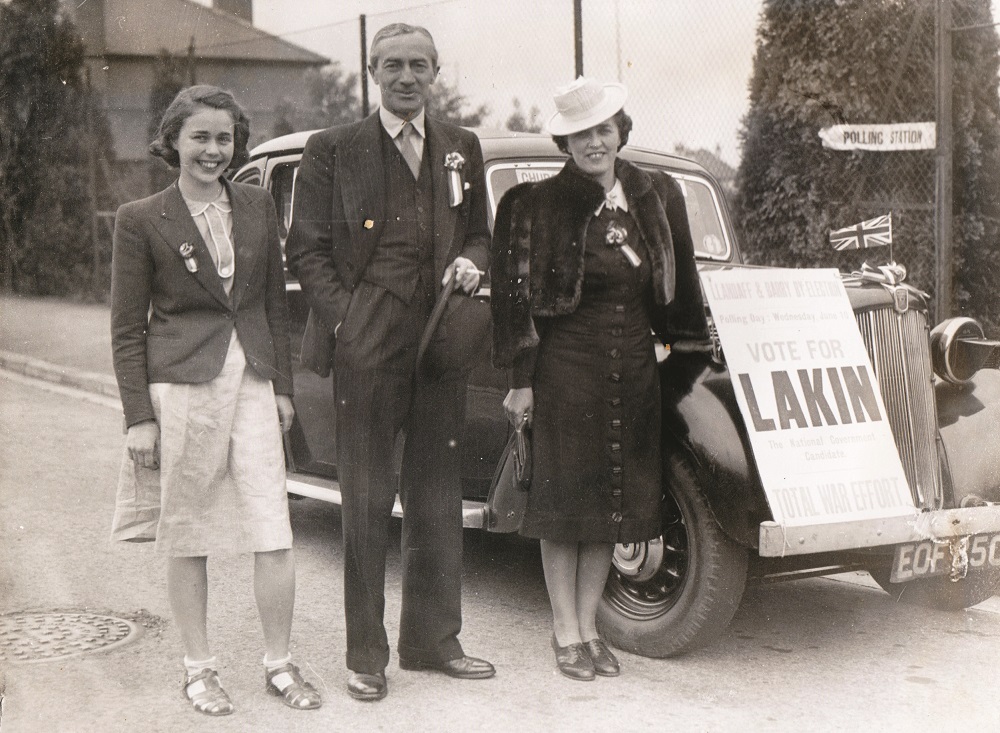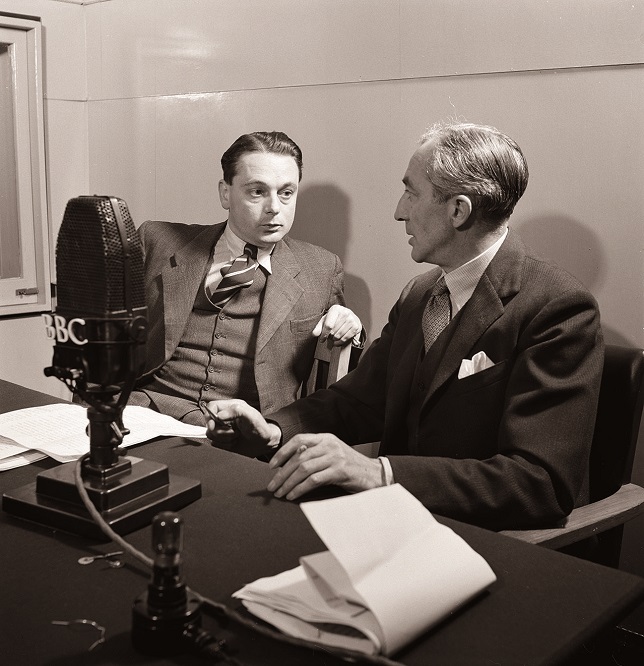‘Joe Stalin Backs Cyril Lakin’: The Barry by-election when the Communist Party campaigned for the Tory candidate

Geoff Andrews.
On the face of it, Cyril Lakin was the ideal candidate to fight the Llandaff and Barry by-election, called in the middle of the Second World War after the sitting Conservative MP Patrick Munro had died in the Liberal Whips office at the House of Commons following a mock ‘Invasion of London’ exercise.
At the time, Lakin, the Sunday Times’s Assistant (and Literary) Editor had been pursuing an unexpected new career as a BBC broadcaster, delivering gentle propaganda in support of Britain’s military campaign to Australia, New Zealand and the other ‘dominions’. This had cemented his patriotism, alerted him to the importance of cross-party alliances and had extended his already impressive range of contacts in Whitehall and Westminster. His suitability for the vacant position was further enhanced by the fact that he was a local boy, born and brought up in Barry at the time when the town was being transformed by the docks.
A war-time electoral truce pronounced that the political party holding the seat would not face any official opposition from rival parties, which suggested that Lakin’s election as the National Government candidate may be a formality. However, there was growing discontent on the left of the Labour Party and beyond with the government’s handling of the war, and many were now calling for a general election.
The candidature of Ronald ‘Kim’ Mackay was promoted on that basis. An Australian lawyer with good links to left-wing intellectuals in London, Mackay received the backing of the 1941 Committee (shortly to become the Common Wealth Party). Its leading advocates were J. B. Priestley (whose popular ‘Postscript’ broadcasts had earlier earned him the unofficial title of ‘Voice of Britain’) and Sir Richard Acland, a former Liberal MP and landowner who was in the process of selling his estates to the National Trust to help fund his electoral machine.
Other well-known figures included Vernon Bartlett, another of Lakin’s former BBC colleagues, who in 1938 had won a by-election as an anti-appeasement ‘Popular Front’ candidate, and Victor Gollancz, whose Left Book Club had helped to publicise aspects of the 1941 Committee’s Nine Point Plan, which included common ownership of property, democratic renewal and upholding political morality.
Though it was a National Government, it was an administration dominated by the Conservatives (who effectively had a majority of over 200) and Mackay and his supporters detected a new anti-Tory feeling. He feared that once the war was concluded there would be a ‘coupon’ election, not unlike the one arranged by David Lloyd George after the First World War, which would recommend only those candidates who had been loyal to the government.
Mackay, an effective campaigner who later galvanised the Common Wealth party’s support sufficiently for it to triumph in three by-election victories over National Government candidates, sought to exploit the vacuum created by the electoral truce at a time when the government’s handling of the war was under scrutiny. Mackay’s campaign slogan, ‘For Democracy! Socialism! Federation!’ reflected the beliefs of an avowed European federalist, a supporter of proportional representation and, like Richard Acland, an advocate of the common ownership of land. His election literature included a programme to ‘nationalise the key industries’, a policy that would be a central component of Labour’s 1945 campaign.
Democracy
This concern with extending democracy, devolution and an idealistic vision of a new fellowship among peoples and nations, was intended to be the basis for a wartime mass movement that could shape the Labour Party in a socialist direction.
In Barry, a town where much of its industrial core were absent on military duty, the appeal to constitutional reform may have resonated more in the suburbs and among the idealistic and professional middle classes. The core appeal of Common Wealth throughout its short life would remain with more affluent voters, but the breadth of the Llandaff and Barry constituency meant it was the home of different classes and social groups with varying outlooks on life. As a port, the town’s biggest contribution to the war effort was at sea – with regular harrowing reports of Barry casualties dominating local news – and this strengthened the notion of a ‘People’s War’, which probably aided Lakin in his campaign.

Despite Mackay’s intervention and the backing of personalities like Priestley, Lakin enjoyed broad support. The playwright Jack Jones, an ex-miner and former communist from Merthyr Tydfil, and an organiser during the General Strike, was one of those who accompanied Lakin on his street tours. Jones was also a First World War veteran who had once stood for Parliament as a Liberal. He was an author who two years earlier had written the dialogue for the film, The Proud Valley, starring Paul Robeson as an African-American sailor who finds work and comradeship in a South Wales mining community.
Speaking with Lakin at a public meeting in Llanishen, Jones denounced Mackay’s candidature as an ‘insult to the courage of men and women who were dying for the freedom of the world.’ Where had Mackay come from? he asked the audience. ‘Out of the blue’, he told them. He reminded them that ‘National Government with party independence is impossible’
Lakin also received support from more unexpected quarters. Buoyed by the Soviet Union’s entry into the war and free of the disastrous ‘Nazi-Soviet Pact’, the Communist Party of Great Britain now called for a second front to defeat the ‘fascist menace’. In their open letter to the electorate, they gave conditional support to Lakin in calling for ‘national unity behind the Churchill Government in fullest military cooperation with the Soviet Union and other Allied nations for the complete defeat of Hitlerite Germany and against all appeasement.
These questions {Lakin} answered in the affirmative. A vote for the Government candidate is a vote for national unity and not for any particular party.’ Lakin’s daughter, who joined her father’s campaign as a fourteen-year-old schoolgirl, recalled that communists held banners proclaiming ‘Joe Stalin Backs Cyril Lakin’.
More importantly, Lakin received the full backing of prime minister Winston Churchill who told him in an open endorsement that he stood ‘for the cleansing of the world from Hitlerism… You are the candidate who stands for the completion and execution of the plans for victory that have been developed by the National Government.’
The campaign remained civil but intense as election day approached. The Conservative Western Mail warned of the ‘confusion’ that would be generated by a general election, while reminding voters that Mackay did not have the support of the Labour Party or the Liberals and was a divisive figure. Lakin himself told voters that ‘Mackay is sneaking {in} the Labour Party programme and trying to slip in the House of Commons by the back door’. On the other hand, both the Manchester Guardian and the Daily Mirror predicted a victory for Mackay, with the latter arguing that Mackay had the ‘undivided support of Labour’.
Lakin’s eventual victory over Mackay was by a margin of 5,655 (the other candidate, an obscure Welsh Nationalist, lost his deposit) reflected the belief that unity at a time of war was the main priority for the electorate who had sacrificed much over recent years. Once in Parliament, Lakin contributed to important debates on the BBC, the Beveridge Report and Butler Education bill, in which he made an impassioned plea to keep Barry’s highly regarded schools within local democratic control, rather than be handed over to a district committee.

At the same time, he continued his broadcasting career, co-presenting the popular ‘Westminster and Beyond’ series with Maurice Webb, the Labour-supporting political correspondent of the Daily Herald. This series discussed topical questions of the day while enabling members of the public to question politicians and public servants.
As a Conservative he was a reformist who was serious about modernising his party so that it could appeal to younger voters. This did not prevent him losing his seat in 1945. Now standing as a Conservative in a straight fight with the official Labour candidate (Lynn Ungoed-Thomas), he did not survive the Labour landslide. Returning soldiers bolstered the electorate, with demands for more and better housing high on their priorities in the campaign for a new start for Barry.
Geoff Andrews is Senior Lecturer in Politics at The Open University. His new book, Smooth Operator: The Life and Times of Cyril Lakin, Editor, Broadcaster and Politician has just been published by Parthian in its Modern Wales series and you can buy a copy here…
Support our Nation today
For the price of a cup of coffee a month you can help us create an independent, not-for-profit, national news service for the people of Wales, by the people of Wales.







Where did you get this article? Ifit had been commisioned by you it would have named ‘the obscure Welsh nationalist’.
I have just looked it up and obscure is on the money,Wikipedia Llandaff & Barry by election 1942 for anyone who is interested.
Considering Gwynfor Evans was active in Plaid and a Barry boy they couldn’t possibly have found a more obscure candidate or indeed version of “nationalism”.